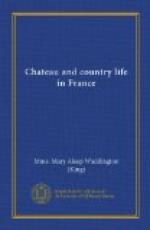The gendarmes passed also very regularly. They always stopped and talked, had a drink with Antoine, and gave all the local news—how many braconniers (poachers) had been caught, how long they were to stay in prison, how some of the farmers’ sheep had disappeared, no one knew how exactly—there were no more robbers. One day two of them passed, dragging a man between them who had evidently been struggling and fighting. His blouse was torn, and there was a great gash on his face. We were wildly excited, of course. They told us he was an old sinner, a poacher who had been in prison various times, but these last days, not contented with setting traps for the rabbits, he had set fire to some of the hay-stacks, and they had been hunting for him for some time. He looked a rough customer, had an ugly scowl on his face. One of the little hamlets near the chateau, on the canal, was a perfect nest of poachers, and I had continual struggles with the keepers when I gave clothes or blankets to the women and children. They said some of the women were as bad as the men, and that I ought not to encourage them to come up to the house and beg for food and clothing; that they sold all the little jackets and petticoats we gave them to the canal hands (also a bad lot) for brandy. I believe it was true in some cases, but in the middle of winter, with snow on the ground (we were hardly warm in the house with big fires everywhere), I couldn’t send away women with four or five children, all insufficiently clothed and fed, most of them in cotton frocks with an old worn knit shawl around their shoulders, legs and arms bare and chapped, half frozen. Some of them lived in caverns or great holes in the rocks, really like beasts. On the road to La Ferte there was a big hole (there is no other word for it) in the bank where a whole family lived. The man was always in prison for something, and his wife, a tall, gaunt figure, with wild hair and eyes, spent most of her time in the woods teaching her boys to set traps for the game. The cure told us that one of the children was ill, and that there was literally nothing in the house, so I took one of my cousins with me, and we climbed up the bank, leaving the carriage with Hubert, the coachman, expostulating seriously below. We came to a rickety old door which practically consisted of two rotten planks nailed together. It was ajar; clouds of black smoke poured out as we opened it, and it was some time before we could see anything. We finally made out a heap of filthy rags in one corner near a sort of fire made of charred pieces of black peat. Two children, one a boy about twelve years old, was lying on the heap of rags, coughing his heart out. He hardly raised his head when we came in. Another child, a girl, some two years younger, was lying beside him, both of them frightfully thin and white; one saw nothing but great dark eyes in their faces. The mother was crouched on the floor close to the children. She hardly




